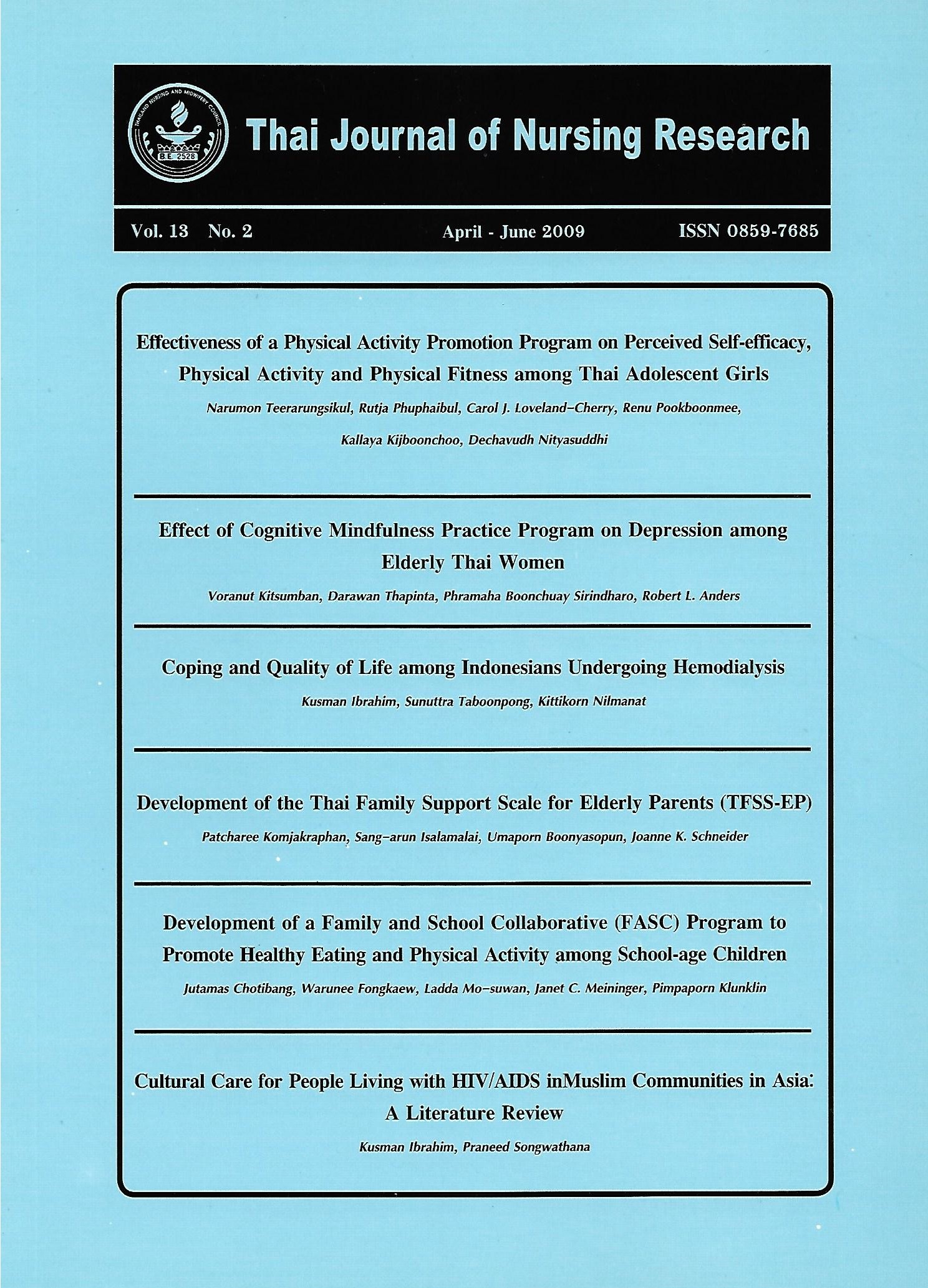Coping and Quality of Life among Indonesians Undergoing Hemodialysis
Keywords:
การเผชิญความเครียด, คุณภาพชีวิต, ผู้ป่วยที่ได้รับการฟอกเลือด, เมืองบันดุง, ประเทศอินโดนีเซีย, coping, quality of life, hemodialysis, IndonesiaAbstract
บทคัดย่อ
การศึกษาครั้งนี้มีวัตถุประสงค์เพื่อศึกษาความสัมพันธ์ระหว่างการเผชิญความเครียดและคุณภาพชีวิตของผู้ป่วยที่ได้รับการฟอกเลือด กลุ่มตัวอย่างประกอบด้วย ผู้ป่วยจำนวน 91 ราย คัดเลือกแบบเจาะจงจากหน่วยไตเทียมจำนวน 3 แห่ง ในเมืองบันดุง ประเทศอินโดนีเซีย เครื่องมือที่ใช้ในการศึกษาประกอบด้วย แบบวัดการเผชิญความเครียดของจาโลวิค และแบบประเมินคุณภาพชีวิตขององค์การอนามัยโลก ผลการศึกษาพบว่า การเผชิญความเครียดโดยมุ่งการจัดการด้านอารมณ์มีความสัมพันธ์เชิงลบกับคุณภาพชีวิตโดยรวม (r = -.27, p < 0.05) การเผชิญความเครียดด้านการมุ่งแก้ปัญหาและการเผชิญความเครียดโดยรวม ไม่มีความสัมพันธ์กับคุณภาพชีวิตโดยรวมอย่างมีนัยสำคัญทางสถิติ ผลการศึกษาแสดงให้เห็นว่า การใช้การเผชิญความเครียดโดยมุ่งการจัดการด้านอารมณ์ ก่อให้เกิดผลกระทบเชิงลบต่อคุณภาพชีวิตโดยเฉพาะหากมีการใช้เป็นเวลานานอย่างต่อเนื่อง ทั้งนี้เนื่องจากสาเหตุของปัญหานั้นยังคงไม่ได้รับการแก้ไข ดังนั้นพยาบาลจึงควรมีการประเมินถึงวิธีการใช้การเผชิญความเครียดของผู้ป่วยอย่างสม่ำเสมอและพยายามสนับสนุนให้ผู้ป่วยที่ได้รับการฟอกเลือดได้ใช้วิธีการเผชิญความเครียดที่เหมาะสมกับตนเอง
คำสำคัญ: การเผชิญความเครียด คุณภาพชีวิต ผู้ป่วยที่ได้รับการฟอกเลือด เมืองบันดุง ประเทศ อินโดนีเซีย
Abstract
This study aimed to examine the relationships between coping and the quality of life among Indonesians undergoing hemodialysis. Ninety-one Indonesians undergoing hemodialysis were recruited purposively from three hemodialysis units in Bandung, Indonesia. Subjects were asked to complete the Jalowiec Coping Scale and the World Health Organization Quality of Life-Brief. Findings revealed a negative relationship between the subjects’ affective focus coping scores and quality of life scores. No significant association was found between the quality of life scores and either the problem-solving focus scores or the total coping scores. The findings support the notion that using affective focus coping might have a negative effect on quality of life when used for long periods and the problem is not resolved. Nurses regularly should assess the coping strategies of individuals undergoing hemodialysis and facilitate their appropriate coping strategies.
Keywords: coping, quality of life, hemodialysis, Indonesia
Downloads
How to Cite
Issue
Section
License
Copyright: The Pacific Rim International Journal of Nursing Research, Thailand Nursing & Midwifery Council has exclusive rights to publish, reproduce and distribute the manuscript and all contents therein.








.png)



